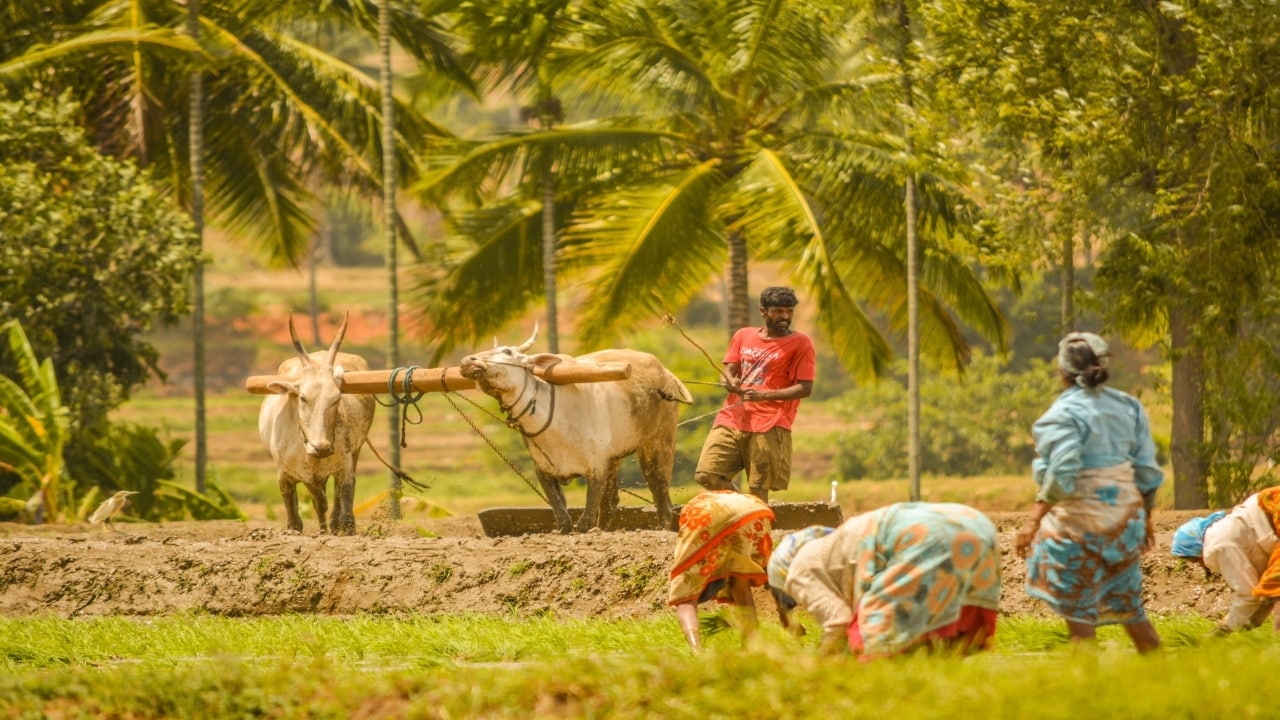What is the story about?
India's agriculture sector is continuing to dominate workforce employment in the rural sector. As per government data, the agri sector has managed to employ the majority of rural workers in the April-June quarter this year. However, agriculture has been one of the worst hit by climate change, low incomes and structural issues. While broader concerns in the agri sector are often discussed, regional inefficiencies remain overlooked. Bharat Intelligence AI, an agritech startup, aims to solve one such issue unique to Maharashtra's agri landscape, the demand-supply mismatch of farm labour. The startup successfully closed a pre-seed funding of ₹7 crore in September, led by Sahyadri Farms, a major grape exporter company.
"Farmers in parts of Maharashtra, like Nashik, told us that labour shortage is the most critical issue for them. These farmers are unable to get timely, skilled labour, a problem which is getting worse and worse," says Azhaan Merchant, Co-Founder, Bharat Intelligence.
Interestingly, the platform has taken a different route from building an application. The startup has integrated its data with WhatsApp and provides a vernacular chatbot for farmers. Once farmers receive a message in Marathi, they can either respond or wait till they get a call from the chatbot itself. These calls are fully automated, however, with little to no difference from an actual human voice and converse in the vernacular language too.
That's not all, the platform also plans to integrate soil testing inputs, crop suggestions, and irrigation patterns, among other advisory solutions via its chat function by this year. "We will be able to analyse their soil requirements and tell farmers, based on that, what type of package or practices they need to follow, or what irrigation schedule, what type of pest disease management they should adopt. We will integrate all that into one experience," says Merchant.
According to the Maharashtra Economic Survey of 2024-25, agriculture labourers in the state exhibit a near gender parity with 49.8% female agri labourers and 50.2% male agri labourers. One can argue that for Maharashtra, operational farm holdings have risen steadily from 4.95 million in 1970-71 to 17.1 million in 2021-22, but average farm size has sharply fallen from 4.28 hectares to 1.23 hectares for the same timelines. This depicts the stark reality of shrinking farm holdings in the hands of farmers.
Fragmentation of land holdings in the hands of a few is not only a crisis for Maharashtra's agri sector. It's well-known that the state is also witnessing a crisis of young people not opting to be farmers. This has now started to reflect in the state's GDP. Per the above survey, income from agriculture and allied services had 26% of the total state income in 1960-61; however, the share has less than halved to 10.7% in 2024-25, led by a shift to services and industry.
Startups like Bharat Intelligence are leveraging the depleting knowledge of farming in the state to provide better inputs on crop patterns. "We built our own pipelines. We're augmenting our own data. This is a very rich problem, because a lot of the data fields, frankly, didn't exist before. We carry out geospatial analytics, assess satellite data, and do a lot of analysis based on that. It's giving us a very good foundation. But ultimately, a lot needs to be done to achieve our vision of creating a friendly rural pipeline," says Merchant.
As Maharashtra's agri economy continues to see the struggle of reducing farm holdings and farmers, agritech startups like Bharat Intelligence are solving human capital issues at the farm currently, but have bigger ambitions of expansion and job generation. This, as the startup has already gained access to 1 lakh acres of farmland with its current operations in Nashik and plans to reach all of Western Maharashtra. For Maharashtra's agri industry, one thing has become clear: the state's farmers need assistance beyond waivers, as niche issues of labour, cropping and market linkages may stall the next phase of growth.
"Farmers in parts of Maharashtra, like Nashik, told us that labour shortage is the most critical issue for them. These farmers are unable to get timely, skilled labour, a problem which is getting worse and worse," says Azhaan Merchant, Co-Founder, Bharat Intelligence.
Interestingly, the platform has taken a different route from building an application. The startup has integrated its data with WhatsApp and provides a vernacular chatbot for farmers. Once farmers receive a message in Marathi, they can either respond or wait till they get a call from the chatbot itself. These calls are fully automated, however, with little to no difference from an actual human voice and converse in the vernacular language too.
That's not all, the platform also plans to integrate soil testing inputs, crop suggestions, and irrigation patterns, among other advisory solutions via its chat function by this year. "We will be able to analyse their soil requirements and tell farmers, based on that, what type of package or practices they need to follow, or what irrigation schedule, what type of pest disease management they should adopt. We will integrate all that into one experience," says Merchant.
According to the Maharashtra Economic Survey of 2024-25, agriculture labourers in the state exhibit a near gender parity with 49.8% female agri labourers and 50.2% male agri labourers. One can argue that for Maharashtra, operational farm holdings have risen steadily from 4.95 million in 1970-71 to 17.1 million in 2021-22, but average farm size has sharply fallen from 4.28 hectares to 1.23 hectares for the same timelines. This depicts the stark reality of shrinking farm holdings in the hands of farmers.
Fragmentation of land holdings in the hands of a few is not only a crisis for Maharashtra's agri sector. It's well-known that the state is also witnessing a crisis of young people not opting to be farmers. This has now started to reflect in the state's GDP. Per the above survey, income from agriculture and allied services had 26% of the total state income in 1960-61; however, the share has less than halved to 10.7% in 2024-25, led by a shift to services and industry.
Startups like Bharat Intelligence are leveraging the depleting knowledge of farming in the state to provide better inputs on crop patterns. "We built our own pipelines. We're augmenting our own data. This is a very rich problem, because a lot of the data fields, frankly, didn't exist before. We carry out geospatial analytics, assess satellite data, and do a lot of analysis based on that. It's giving us a very good foundation. But ultimately, a lot needs to be done to achieve our vision of creating a friendly rural pipeline," says Merchant.
As Maharashtra's agri economy continues to see the struggle of reducing farm holdings and farmers, agritech startups like Bharat Intelligence are solving human capital issues at the farm currently, but have bigger ambitions of expansion and job generation. This, as the startup has already gained access to 1 lakh acres of farmland with its current operations in Nashik and plans to reach all of Western Maharashtra. For Maharashtra's agri industry, one thing has become clear: the state's farmers need assistance beyond waivers, as niche issues of labour, cropping and market linkages may stall the next phase of growth.























